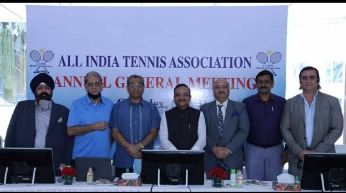Sher-e-Kashmir University of Agricultural Sciences and Technology of Jammu (SKUAST-J) launched a groundbreaking two-day training program on wildlife health monitoring. Veterinary Doctors from Animal Husbandry, Sheep Husbandry, Zoo veterinarians post graduate scholars participated in the programme. Expert lectures were delivered by the distinguished scientists from USA, Central university and Wildlife Institute of India. The event, led under the dynamic guidance of the Honorable Vice-Chancellor, Prof. (Dr.) BN Tripathi, and graced by the esteemed presence of the Dean, FVSc & AH, marks a significant initiative to sensitize and set the tone for future wildlife health monitoring at the wildlife-domestic interface in Jammu and Kashmir.
Dr. Kafil Hussain, Organizing Secretary, delivered a welcome address, underlining the significance of the training program for wildlife health monitoring in the region. Prof. (Dr.) Rajiv Singh, Head of the Medicine Division, provided insights into critical aspects of wildlife health, reinforcing the importance of collaborative efforts in the field. He further informed that the wildlife is an economically, ecologically and aesthetically valuable resource for mankind. Underlining the importance of the topic he said that wildlife suffers from various diseases, which can spread from domestic animals to wild animals and vice-versa. Dr. Khurshid Khan, Deputy Director of the Ministry of Environment, Forest and Climate Change, Jammu Division, and a special video message from Dr. Benji Alacanter, Head Veterinarian at Wildlife Safari, Oregon, USA, added an international perspective to the discussions.
Dean, Dr. Rajesh Katoch, emphasized the groundbreaking nature of the training program and its potential to shape the future of wildlife health monitoring in the region. Underlining the importance of the topic he said that wildlife suffers from various diseases, which can spread from domestic animals to wild animals and vice-versa. Besides this wildlife is a source of infection for human population and many a times the disease may occur with enhanced virulence as in case of avian influenza and rabies which are zoonotic diseases of high-risk categories. The two-day training program signifies the university’s commitment to advancing knowledge in wildlife health and promoting environmental responsibility. The Honorable Vice-Chancellor under whose dynamic leadership the event was held, lauded the university’s initiative, making it the first of its kind in Jammu and Kashmir to sensitize and set the tone for future wildlife health monitoring. Ms. Abha Tikoo, Associate Professor concluded the event with a vote of thanks, expressing gratitude to all the distinguished guests for their contributions to this pioneering effort. SKUAST-J takes pride in spearheading this initiative, establishing a blueprint for future endeavors in wildlife health monitoring in Jammu and Kashmir













